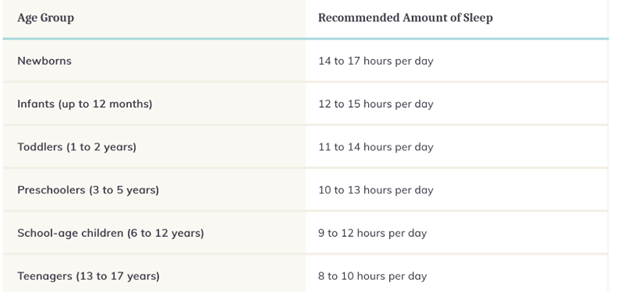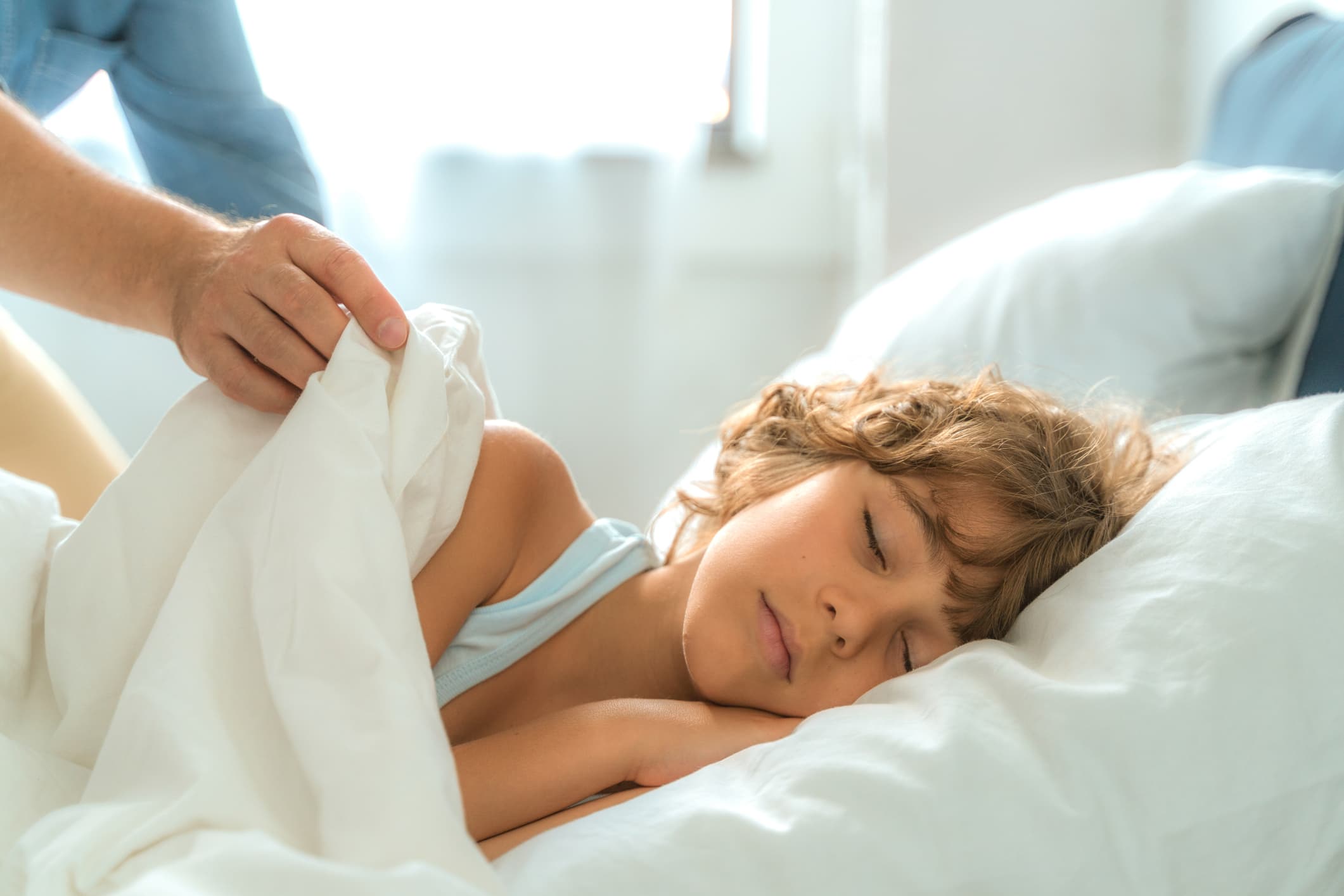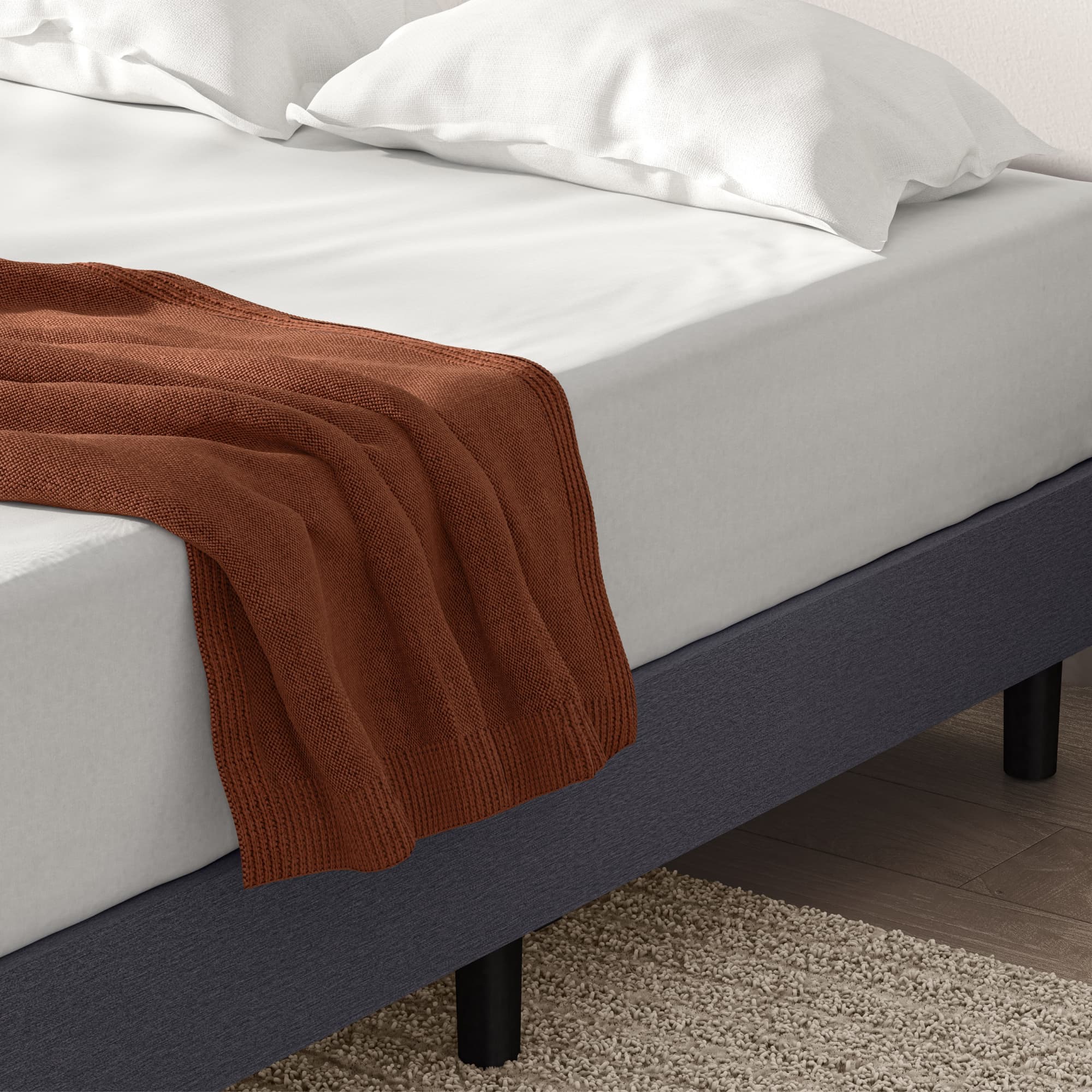Everyone needs and deserves a good night’s rest, and if you're a parent, you've probably wondered how much sleep your kids need. It's a great question that varies by your child's age group.
In general, children need more sleep than adults do. Why? Because sleep is the key to healthy growth and brain development, says the National Sleep Foundation. Sleep also plays a crucial part in memory consolidation, executive function, mood, learning, and motor skills development.
This article will address how much sleep kids need, ranging from preterm infants to newborns, toddlers, pre-teens, and teens, helping you to ensure your child's healthy sleep habits are optimized throughout their childhood and beyond. And let's not forget you! Parents need to be able to sleep like a baby, too.
Here's a handy chart about how much a child sleeps during each phase of development.

How much sleep do kids need - preterm babies
Nearly 10 percent of babies in the U.S. are born preterm or premature, which is defined as less than 37 weeks of fetal development. That means one out of every ten babies is born early. So, it's essential to recognize how preemies' sleep patterns are quite different than a typical newborn's. Preemies often sleep around 90 percent out of every 24 hours .
Think about how noisy the Newborn Intensive Care Unit (NICU) is. Preterm infants need gentle activity during the day, daytime naps when they tire, and a soothing sleeping environment at home. Just like for newborns, pediatricians recommend using a soft nightlight, a ticking clock, or soft music playing and encouraging self-soothing behaviors such as sucking on a pacifier or the baby's own hand. Some recommend bringing a preterm baby's crib or bassinette into the parent's room until the baby is at least six months old.
How much sleep do kids need - newborns
Newborns are tiny sleep machines. According to the American Academy of Pediatrics, newborns sleep between 16 and 17 hours each day. The rub is that they usually wake up after just one to two hours. Maybe it's from a wet diaper. Very often, it's from hunger, especially if the infant is breastfed. This wake cycle is natural. So long as your newborn is growing properly, at a healthy weight, urinating normally (approximately four wet diapers each day), and pooping about three times daily, don't be concerned. If your infant isn't meeting these benchmarks, contact your pediatrician immediately.
Newborn sleep is also important because it aids in the development of circadian rhythm , healthy neurocognitive development , and establishing healthy sleep habits for a lifetime.
From the beginning, establish a calming bedtime routine, such as a warm bath, reading a short story, singing a lullaby, making sure they're in a warm sleeper, using white noise, and whatever else enhances your child's sleep patterns.
This tip is important — no blankets and no pillows. That's why that cozy sleeper is necessary. Why? To prevent accidental suffocation, a common cause of SIDS (Sudden Infant Death Syndrome).
How much sleep do kids need - infants
For infants between four to eleven months of age, their sleep needs begin to taper down to 12 to 15 hours of sleep a day. Maintaining their established bedtime routine is essential.
This is also when consolidation of sleep begins, and hopefully, your efforts at helping your baby develop healthy sleep habits are bearing fruit. It's not unusual for an infant to sleep up to six hours. This is largely because they don't need to feed as often as a newborn. Of course, daytime naps are still crucial for this age group.
Signs your infant isn't getting enough sleep include:
- Being fussy or cranky
- Crying
- Rubbing their eyes
What about colic? Colic affects between 17 percent to 25 percent of all infants ages three to six months old. Besides being potentially painful and stressful for your baby, colic is one of the biggest causes of infant (and parental) sleep deprivation. What causes colic? The jury is out, but common causes are thought to be:
- Gas pains
- Overfeeding
- Intolerance of certain food
- Intolerance to proteins in breast milk
- Fear, frustration, or excitement
If you're breastfeeding a colicky baby, keep track of what you've had to eat over the last 24 hours. For instance, some babies can't handle the acidity of tomatoes. Other triggers can include chocolate or caffeine, dairy products, or nuts. If colic continues, please let your pediatrician know so she can examine your baby and rule out any physiological problems.
How much sleep do kids need - toddlers
Toddlers are little movement factories. While physical growth will begin to slow, your little one will make huge strides emotionally, socially, and intellectually. They still need their sleep — up to 14 hours a day to recharge them from physical activity and overall mental stimulation. Let's face it: it's exhausting to be a toddler. They play hard, learn hard, and sleep hard. One-year-olds are all about imitating behaviors and concentrating on their tasks intensely.
Two-year-olds begin developing motor skills even more. Running, jumping, catching, and throwing are some favorite activities. Of course, these activities expend energy, making sleep a priority. Like one-year-olds, two-year-olds require between 11 to 14-hours of sleep every day, including daytime naps which are great for recharging their batteries. Part of this is because they are so focused on early individuation. Early signs of this include frequent use of "no!" and "mine!" This is normal — think about it as early training for parenting an adolescent.
Toddlers are usually transitioned from a crib to their own bed at this age. While shopping for your toddler's new bed, consider a Leesa twin size Studio or Original mattress on our platform base.
How much sleep do kids need - preschoolers
Preschoolers are a whir of motion, energy, independence, and sometimes bossiness . Whether you're a stay-at-home parent or sending your child to daycare, this can be a challenging time. If your little one is going to child care, it will disrupt her sleep schedule and take some adjusting, especially since preschoolers require 10 to 13 hours of sleep each day. Hopefully, part of the child care routine includes nap time of at least an hour.
Preschoolers are often prone to nightmares or night terrors. These usually happen during the deepest stages of sleep. Besides immediately reassuring your child, maintain a consistent sleep routine . Allow your child to take a stuffed animal or a special blanket to bed each night. Before you do, make sure the object is without choking hazards such as ribbons, buttons, or rips, which could allow the stuffing to come out. If sleep problems continue, be sure to consult with your pediatrician. The doctor may ask you to maintain a sleep diary before suggesting asleep medicine consultation.
How much sleep do kids need - school-aged
Between ages 6 through 13, children need fewer hours of sleep--around 9 to 11 hours of sleep every day. Once again, a bedtime routine should be followed, although much less rigid than when your child was very little. Allow him to pick one or two stuffed animals to curl up with. Keep reading, but only a chapter, not the entire book. Or, allow her to choose a sleep CD or meditation program, especially if she has trouble sleeping. Keep it down to one choice, not three or four. School-age children are often masters at procrastinating when it comes to bedtime. Don't be surprised if your school-age kiddo comes home from school and takes a short nap before tackling homework and other after-school activities. Try not to keep their schedules so stuffed that they're exhausted. For older children, step back and allow her to drive her bedtime routine. This helps foster a sense of self-reliance and still makes sure they are getting sufficient sleep.
Also, please recognize the onset of puberty can disrupt sleep. While sleeping time may shorten, the quality of sleep may improve.
How much sleep do kids need - teens
Teens are a tricky age group. They feel like adults, but they're stuck in the middle between childhood and being a grown-up. Studies have shown the average teen gets only 7 to 7 and a half hours of sleep a day, while the reality is they need more like 9 hours of sleep. Most teens are dragging through each day with sleep deprivation that can't be made up for on weekends.
Sleep deprivation can have negative impacts on mental health and physical health. The Sleep Foundation mentions sleep deprivation often leads to teen substance abuse and other high-risk behaviors. Lack of sleep can also put a teen at higher risk of mental health issues , including depression, bipolar disorder, anxiety, and even suicide.
Reasons are varied. Parents, as well as the Sleep Foundation , mention:
- Too much screen time and exposure to blue light
- Worries about school
- Early school start times
- Too much caffeine from coffee drinks, sodas, or energy drinks
- Excessive homework
- Issues with anxiety and/or depression
- Being ADHD or on the autism spectrum
Teens may also require a larger bed than the twin they used when they were younger. For tall teens, imagine the discomfort of having your feet hanging off your bed every night while trying to sleep. If your teen's room only has enough room for a twin mattress, consider upgrading to a Leesa Twin XL mattress that offers a standard queen mattress length.
Parents, it's up to you, no matter the age of your child or children, to model good sleep habits and hygiene. Remember: young children are great imitators, and by the time they reach elementary school, kids' sleep habits will be deeply ingrained.
Remember: take care of yourself, too
Whether you're a single parent or have a partner, self-care is an important part of taking good care of your kids. Self-care isn't synonymous with self-indulgence. Instead, it's a way to keep your emotional, mental, physical, and spiritual health aligned. According to the National Alliance on Mental Illness (NAMI), self-care includes the following:
- Physical — Daily maintenance (brushing your teeth, bathing, exercising), getting enough sleep regularly, or something more intentional, such as a massage or a pedicure.
- Psychological — Counseling, taking medication for a mental health issue and having consistent relationship boundaries.
- Emotional — Journaling, meditation, knowing how to say no, deep breathing exercises, or taking time for yourself, doing something you enjoy
- Spiritual — Self-reflection, prayer, practicing gratitude, attending a house of worship, being in nature.
- Social — Meet up with a friend, join an online social group, connect with other parents, enjoy group activities such as hiking, biking, or more
- Professional — Keeping work time and family time separate, get a standing desk, find a new job if you're in a toxic environment
How much sleep do kids need by age chart?
Please refer to our age chart at the start of the guide. Remember, premature babies, sleep up to 19 hours each day instead of full-term newborns.
Is 5 hours of sleep enough for a 10-year-old?
Not at all. Pediatricians and sleep medicine experts recommend 9 to 12 hours each day for children in that age group.
What time should my 7-year-old go to bed?
It depends on your schedule and their school start time. Just be sure your 7-year-old is getting the recommended 9 to 12 hours each day to make sure their sleep is optimized.
Is 10 hours enough sleep for a 7-year-old?
In general, yes, although pediatricians recommend up to 12 hours of sleep for that age group.
How to get a kid to sleep in his/her own bed?
There's nothing wrong with a Saturday morning pile-on, with kids jumping on your bed to wake you up. It's another thing when they won't sleep in their own bed. Make sure you have a good bedtime routine, a set bedtime, and are consistent. Eventually, they'll settle down for a good night's sleep.
Can Leesa help you and your kids have a better sleep?
First, if you're sleeping on an uncomfortable mattress, revolutionize your own sleep with a Leesa mattress. It's an investment in your personal well-being and will make a difference in your mood, sleep quality, and physical comfort. Too often, we parents deny ourselves necessary items so we can provide for our kids. Consider a Leesa mattress as a solid form of self-care. Whether you or your child or young adult needs a wonderful sleep environment, Leesa has exactly what you need. Whatever the case, we've got your back.



.jpg&w=3840&q=75)